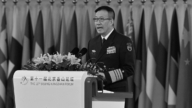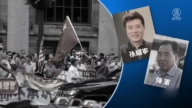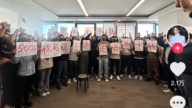【新唐人2014年02月04日讯】最近,美国媒体推出了世界各国比工资的活动。根据中共国家统计局公布的最新收入水平,中国高收入阶层的工资水平与南非司机的工资水平相当,而中等收入的人均收入,仅仅相当于泰国清洁工的工资水平。那么号称全球第二大的经济体,民众收入为何如此的低,中国的财富哪里去了?我们来看看专家的分析。
美国有线电视新闻网《CNN》网站,日前推出了与世界各国比工资的活动,只要输入你的收入水平,就能知道你与埃塞俄比亚的老师、南非的司机、英国女王等工资的对比。
根据中共国家统计局最近公布的数据,2013年,大陆城镇居民人均总收入为29547元,56389元人民币属于高收入人群,而中等收入组的人均收入为24518元,低收入组人均11434元。
有记者输入这些数字与其他国家的收入水平做了一番比较,发现中国的高薪工资水平相当于南非司机的工资水平,是英国女王工资的五千分之一,而中等收入水平与泰国清洁工的工资水平相当,低收入组的人均收入只有泰国清洁工工资的一半,是英国女王工资的二万分之一。
另外一份2013年全球每小时最低工资水平报告显示,中国内地排在第17名,最低薪酬每小时只有0.8美元。在榜单中,澳大利亚以每小时16.88美元位居榜首,法国以每小时12.09美元的薪酬居第二,新西兰以11.18美元排名第三。
中共统计数字显示,到2010年,中国的GDP总量己经超过日本,成为世界第二大经济体。
那么中国的钱到哪里去了呢?
中国金融智库研究员巩胜利:“一个钱去了国有企业,还一个钱,比如财政收入,中央占大头,省级政府占中头,还有县市级政府,中央政府占的最大,大概超过60%,还有一少部分去了所谓的富人,只占了10%左右。”
中国金融智库研究员巩胜利指出,35年的改革,中国的GDP数字翻了10几倍,老百姓的工资收入,一直没有成比例增加,相反,税收却变着花样的增加,以及天量的货币投放导致通货膨胀,使得老百姓变得更穷。
据了解,2013年中国的货币投放量大概是2010的几乎六倍。
大陆公民监政会发起人郭永丰:“所谓的国家也是党的国,党国,不是人民的国,人民只是奴隶,在这么一个国家它怎么会管人民的死活?一切它都是自我标榜,说我们政党养活人民,哪一个国家的政党敢说这样无耻的话,你一个政党怎么养活人民,你劳动了吗?你干活了吗?你有什么技术?”
尽管中国民众的收入不及南非,中共政府还是不忘向南非捐钱,捐物和进行军事援助,2006年6月,中共向南非政府提供了2000万元的无偿援助,用来实施人力资源培训项目。中共还为南非农村援建了1000套住房,计划再建400套。 去年4月,中共再次向南非投资35亿美元,
郭永丰:“收买人家给它说好话,进联合国常务理事国是它收买的结果,如果它不收买,它能进吗﹖原来在毛泽东时候,他也援助很多国家,而且好多国家的人民人家都吃肉,中国人连树皮都没(得)吃,他一样搞援助。”
大陆《每日经济新闻报》的“每经智库”专家蔡慎坤,在文章点评中指出,光鲜的GDP数字,并不代表中国解决了困扰数百年的贫困难题,相反,中国现在已是世界上收入差距最大的国家。贫富悬殊收入差距扩大,一直刺痛着公众的敏感神经。
“中国经济改革研究基金会国民经济研究所”副所长王小鲁,从2010年所做的调研报告中得出:中国收入最高的10%家庭与收入最低的10%家庭,人均收入相差65倍。
而联合国计划开发署的统计数据显示:目前中国占人口总数20%的最贫困人口,所占收入或消费的份额只有4.7%,而占总人口20%的最富裕人口,却占有高达50%的收入或消费份额。
采访编辑/刘惠 后制/李智远
Workers in China’s high paid jobs make as much as Taxi Drivers
CNN’s Global Wage Calculator is an online tool that compares
one’s wages with those in other nations.
Its data from from the Chinese government shows that the
closest equivalent for those in China’s “high income” bracket
of urban disposable income are taxi drivers in South Africa.
The average annual salary of a worker in China‘s private sector
is roughly the same as a cleaner in Thailand.
With China’s status as the world‘s second-largest economy,
why do its people earn so little?
Where has China’s wealth gone?
Our reporter has more on the story.
CNN’s online global wage calculator allows global wage
comparisons, whether it is a teacher in Ethiopia,
a taxi driver in South Africa, or the Queen of England.
Data from the Chinese National Bureau of Statistics shows that
the total per capita income of urban residents in 2013 was nearly
30,000 yuan, while those in the high-income group earned over
56,000 yuan, the middle-income group nearly 25,000 yuan,
and the low-income group earned over 11,000 yuan.
A reporter plugged in data to make a comparison and found
that China’s high-income wages are the same as a taxi driver’s
wages in South Africa, 0.01% of what the Queen of England
makes in a year; middle-income levels are the same as a
cleaner’s wages in Thailand; and low-income groups make
half the per capita income of cleaners in Thailand,
0.005% of what the Queen of England makes in a year.
According to the minimum wage report of 2013, China ranked
the 17th with the minimum wage of U.S. $0.8 per hour,
whereas Australia topped the list for $16.88 per hour,
France $12.09 ranked second, and New Zealand $11.18 ranked third.
Based on the Communist regime‘s data, China has become
the world’s second largest economy in 2010 with its GDP
exceeding that of Japan.
So where is China’s money, then?
Gong Shengli, Chinese financial think tank researcher:
“Some of the money has gone to state-owned enterprises,
and some to governmental revenues.
The central government takes the most, roughly over 60%,
the rest is spread among the provincial governments and
the county and municipal governments.
Lastly, some so-called rich people are getting about 10%."
Gong Shengli says that for 35 years of reform,
China’s GDP has increased more than 10 fold,
but the people’s income has not increased proportionally.
To the contrary, all sorts of taxes have increased,
and the inflation caused by massive cash injections have
made the Chinese even poorer.
Last year, China injected almost six times
the amount of cash it injected in 2010.
Guo Yongfeng, Federation of Chinese Citizens for Supervision
of the Government founder: “The so-called state is the party’s,
not the people’s. The people are slaves to the state.
This state cares for no one. The party only proclaims itself as
a hero that nurtures the people. Such a shameless statement.
This state has done nothing to nurture the people."
Although earnings in China are less than in South Africa,
the Communist regime has continued to donate and
provide military aid to South Africa.
In June 2006, the regime gave 20 million yuan ($3.3 million)
in aid to the South African government
for the implementation of human resources training project.
The regime also built 1,000 housing units in rural South Africa,
and plans to build another 400 units.
Last April, the regime invested $3.5 billion to South Africa again.
Guo Yongfeng: “It is bribery. Without it, how could China have
entered the United Nations Security Council?
It was the same in Mao Zedong’s era, he also aided countries.
But many of them were already doing much better than the
Chinese people, who had to live on eating
the already scarce tree bark."
Chinese economic think-tank expert Cai Shenkun says
in his article that the flashy GDP figures do not represent
poverty issues have been resolved in China.
On the contrary, China has the world’s largest income gap.
The widening disparity continues
to be a thorn in the side of many.
The deputy director of the China Reform Foundation’s national
economic research institute says that a 2010 research report
shows that the per capita income for households in the top 10%
income is 65 times higher than the lowest 10% income in China.
Statistics from the United Nations Development Programme
show that China’s poorest people make up 20% of the
total population and only 4.7% of the income or consumption,
while the most affluent 20% of the population occupy
up to 50% of the total share of income or consumption.
Interview & Edit/LiuHui Post-Production/LiZhiYuan






























